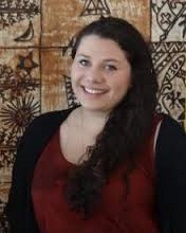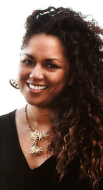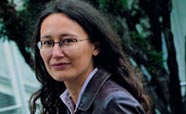Clara Pau

Clara Pau
Master of Indigenous Development/He Kura Matanui
Raised in Alexandra, Central Otago, among the tussocks and the schist, Clara Pau didn't have a long journey to the University of Otago.
Her path since, however, has been a winding one. Her love for science and equal passion for English have taken her in different directions and she is now following a third love - Indigenous Development/He Kura Matanui.
With an honours degree in English and a bachelor's degree in Botany already under her belt, she is now using her Master of Indigenous Development/He Kura Matanui to examine how New Zealand-born Samoans express their ethnic identities.
"It's highly autobiographical, which is why it's so powerful for me," she says of her one-year research degree. As one of few Pacific Islanders growing up in a small rural town, she says the idea of sometimes fitting in with two ethnicities, but also sometimes fitting in with neither, affects her often and she is curious how her experiences differ from her non-New Zealand born Samoan friends, if they do at all.
Clara has found the change to postgraduate study after two undergraduate degrees empowering.
"At postgraduate level you are more a master of your own destiny. You do have to put in the hard yards, but it's really rewarding." Working with a supervisor rather than a distant lecturer is also a pleasure".
As a postgrad you have to come out of your shell a bit and know when to ask for help. It's a really nice mixture of professional and personal with my supervisor. Both supervisors I have had are full to the brim with knowledge and ideas about their subject areas. I couldn't have come this far without them, always helping me to develop my own ideas and thinking around not just my topics, but my opes and aspirations."
Clara, who has been assisted by several scholarships during her time at Otago and is grateful for the assistance she has had from the Pacific Islands Centre on campus, says she plans to travel after completing her master's. A PhD is "definitely" part of future, although in which of her passions she's not sure.
"I really want my time at University to transcend academia. A reason I came here was because of the people who made it possible and who encouraged me, and if I can do something which encourages and enables others then I will be very happy."
Irene Hundleby

Irene Hundleby
PhD Music
For Irene Hundleby, the PhD she is about to embark on is just part of her journey into the musical traditions of her Solomon Island roots.
From Malaita on her mother's side,and New Zealand on her father's,Irene will spend the next three years researching the music of women in Lau Lagoon, Solomon Islands.
"It's something I've been aiming towards for about 10 years. This research is close to my heart and something I'm passionate about, and as such, it has more significance to me than the PhD alone."
Irene began her study into this area of music through her dissertation as part of her Bachelor of Music (Honours)degree at Otago in 2013.
While that looked at traditional music from the 19605 to 2012, her PhD will be part conservation of culture and preservation of knowledge, and part analysis of Malaitan women's music.
"Otago's Pacific Island Centre is fantastic and is a great help to connect students to other groups as well as providing a sense of unity for Pacific Island students.
"For me, it has a myriad of potential opportunities. "I hope to support Pacific Island research, to break ground in a new area of research - no one has studied women's music from the Solomons before - as well as contribute to my community and give a voice to my people."
Irene was raised in Auckland and started her academic career studying science. In the early 2000s she began a career in neuromuscular therapy and then moved to Dunedin for love, but always knew she wanted to continue to study and eventually chose music.
"Music was always an important part of my life and for a while there was a tug-of-war between my love of science and music."
When she moved south she found a "really supportive community" of locals with roots in Vanuatu, Papua New Guinea and the Solomon Islands.
"There are very few students who come to Dunedin from that area of the Pacific, and it can be very lonely if you're on your own.
"That's one of the joys about Dunedin - thanks to the University it's multicultural and a large number of people from lots of different places have made a home here."
Mele Taumoepeau

Dr Mele Taumoepeau
PhD Psychology
Despite the good advice Mele Taumoepeau had received about seeking a high quality supervisor, reality took the decision somewhat out of her hands. Mele's preferred supervisors were overseas or busy. And as a mature student who had neither researched this area of psychology before, nor studied at Otago, she had neither the contacts nor knowledge to open the right doors, or know which ones to knock on.
Ultimately she was paired up with a new academic in the department, with a similar research interest in children's social cognition, keen to help her explore how children develop an understanding of their social world. “He turned out to be fantastic. But it was luck.”
All the same, Mele says she didn't rush into the arrangement. “I read his CV and the publications he'd written. I met him, took away some readings, met him again. I was sussing him out. The most important thing is that you get on, and I wanted to be sure of that.”
The shift from working life as a speech language therapist to full-time study and parenthood was “tricky” says Mele. And as two newbies, Mele and her supervisor were in a similar situation, both figuring out the systems at Otago. “There was another postgrad in the department who saved me, basically,” remembers Mele. “She would tell me where to get money for conferences from and how things worked.”
Mele also acknowledges the support of her husband and friends, as well as the University's Pacific Islands Centre. She made the effort to attend as many symposiums and social events as possible, “often with my two daughters in tow – they came everywhere with me”.
She came to rely on the University childcare and Kelsey Yaralla Kindergarten, “which became like extended families”.
“Towards the end I imported my in-laws from the UK to look after the kids so I could get my thesis finished.”
PhD study was, says Mele, a juggle. And a somewhat self-indulgent one at that. She was constantly aware that she was being afforded an opportunity to immerse herself in a field of study, and recalls a sense of great responsibility to make the most of it.
But, she says, “I adored it. It was difficult, and I remember looking at a stack of 30 journal articles in an area I'd never studied before and realising I needed to plough through them. But the wonderful thing was, I was allowed to!”
